Windows 7 Performance Guide
by Ryan Smith and Gary Key on October 26, 2009 12:00 AM EST- Posted in
- Systems
Laptop Performance
With the different power and performance characteristics of a laptop (not to mention the battery!) we’re going to break out our laptop results from the rest of our desktop data.
If you have seen our OS Mobility Explored article, where we compared laptop usage across Windows and Linux, then you should have a pretty good idea of what you’re about to see. The following is a selection of the most relevant data from that article, using Gateway’s very similar Intel and AMD power laptops: the NV5807u and NV5214u respectively.

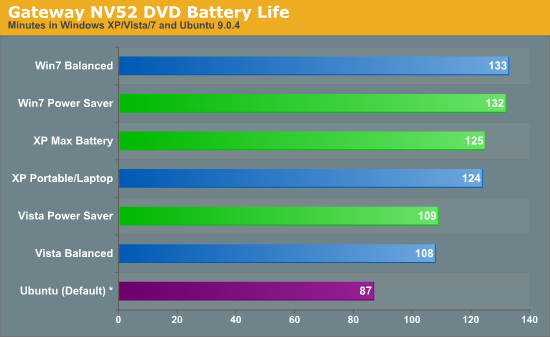
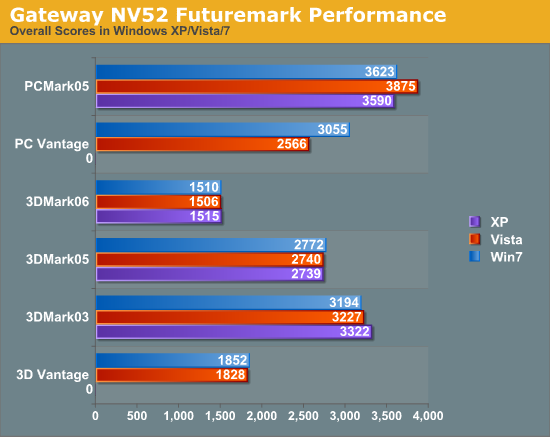
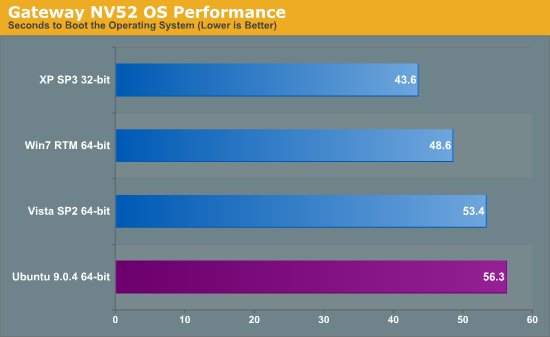
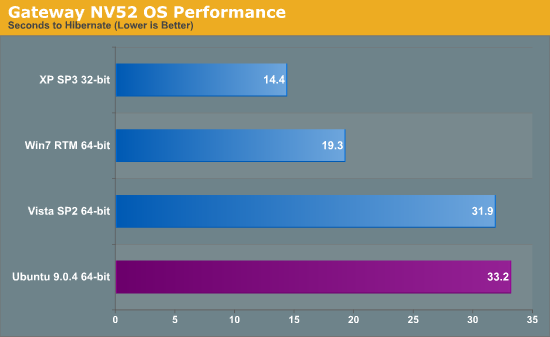
Starting with the NV52, our Athlon 64 X2 laptop, we see some immediate advantages for Windows 7. In terms of battery life it edges out Windows XP in all situations, and clearly surpasses Vista, particularly in DVD playback. As laptops have been one of Vista’s most troublesome areas, it’s here where Microsoft needed to see some real improvement, and they have delivered.
Meanwhile performance in our limited suite of benchmarks is largely tied. Vista wins in PCMark 05 only due to higher scores in the transparent windows test (something we suspect is a product of the WDDM 1.1 memory optimizations), XP takes 3DMark 03, and Win7 takes PCMark Vantage. Our tendency is to put more weight in to PCMark Vantage, since it’s quantifying the improved laptop performance that we’ve been experiencing, but aren’t necessarily seeing in other benchmarks.
Finally we have boot and hibernation times. Microsoft has been putting some effort in to bringing down the boot times of Vista, and it shows here, although XP is too tough to beat. Hibernation is a similar story – it’s easier to resume from hibernation when you have less stuff to load.
The NV52 paints what’s probably going to be the average picture for Windows 7 on laptops. It’s as fast (if not faster) than XP and can pull off a slightly better battery life, but it’s not going to be able to beat XP in booting/hibernating.
Next we have the NV58, our Intel C2D laptop.
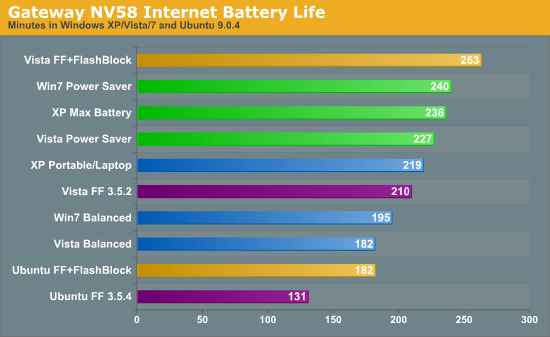
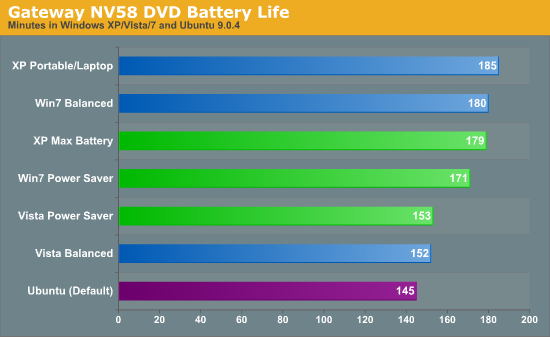
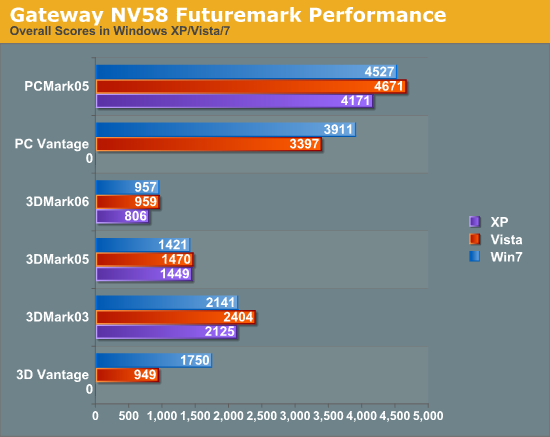
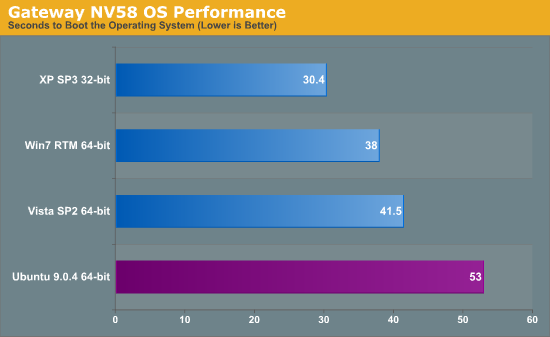
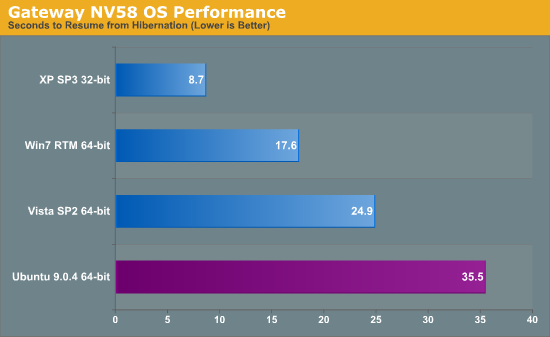
With battery life, we see some things similar to the AMD based NV52, and some things are different. Vista is still a loser, but Win7 doesn’t manage to build any kind of lead over XP in DVD playback, letting XP take it by a small margin. Battery life in our internet testing does go to Win7 however, once again with a small margin.
As for performance, we largely have the same results as with the NV52. Win7 wins PCMark Vantage, the test we care the most about, and pulls near-even elsewhere. 3DMark Vantage is an outlier this time, but this seems to be related to the Intel integrated graphics in this laptop.
Finally boot and hibernation times are similar to what we saw with the NV52. XP is still faster to boot and faster to return from hibernation, the benefit of an older, lighter-weight operating system. Win7 does handily beat Vista in all cases, however.










207 Comments
View All Comments
Tewt - Monday, November 2, 2009 - link
Toms pretty much had the same conclusion as Anandtech. Here is a quote from their conclusion:"From the benchmarker’s standpoint, the change from Windows Vista to Windows 7 is simply a matter of documentation."
I wish someone would quantify the "snappy" feeling or the "it feels faster" they get from Windows 7 because I'm not seeing a compelling reason to move from Vista from either article on the two sites.
werfu - Monday, October 26, 2009 - link
I absolutely love Win7. I've installed the RC on my Thinkpad T61p and it's a real pleasure to use it compared to Vista. It's more responsive, not like Vista sluggish experience. However, the ACPI driver for the T61p don't work right. The screen doesn't dim and power management don't work right. I think that's really odd, as it's been working right under Vista and Linux.Also, I wonder if the NAS test was done using a Large Packet enabled NAS. It do make a huge difference on networking gear that support it.
strikeback03 - Monday, October 26, 2009 - link
Have you checked for updated drivers recently? Lenovo had a bunch of Win7 drivers for my T43 which were all dated within the past week.7Enigma - Monday, October 26, 2009 - link
Did you happen to do any benchmarking or "general user responsiveness" when you upgraded the systems? I have upgraded 3 systems since Windows 95 and in every case I ended up reformatting and doing a clean install; not because of a hardware/software issue, but rather because some unknown demon made the systems chug.I've seen this same issue with the move from XP SP2 to SP3 on my dad's computer (in this case to the point where we actually rolled back to SP2). In that instance it is possible the extra security features/etc. on an older system that just couldn't take it, but in the other instances it seemed to be a major problem.
Any comments by the authors would be greatly appreciated.
Ryan Smith - Monday, October 26, 2009 - link
One of the systems that I did the upgrade install on was my personal system. I'm not going to publish any numbers since they aren't rigorous enough, but before and after testing didn't reveal any differences in performance. It continues to perform just as well as any other Win7 system I have.7Enigma - Tuesday, October 27, 2009 - link
Thank you for the response Ryan. Honestly while the articles are fantastic, it is the timely comments from the authors that make this site the best.Postoasted - Monday, October 26, 2009 - link
Had been using XP64 for about 4 years and lived through all its teething problems. Had been totally satisfied except that with some programs it couldn't regulate the RAM efficiently. I have 6 gigs of RAM and would ofter run out while using some apps. With 7 Ultimate I can watch an H264 movie, have FF open and encode a movie all at the same time and have RAM left over. For me Windows 7 was the fix.nafhan - Monday, October 26, 2009 - link
I'll go out on a limb and say that anyone who feels comfortable configuring POP3/SMTP settings would also be comfortable downloading the free mail client from MS (or Thunderbird, etc.). Businesses will likely have MS Office installed (including Outlook). Non-technical users generally use webmail.So, the only group I can come up with who would want it installed by default is tech-savvy users without Office, that prefer MS's free desktop client over webmail, and don't have admin rights to install it themselves or access to IT support to install it for them.
jay401 - Monday, October 26, 2009 - link
Gary - Whatever happened to the P55 motherboard reviews and round-up articles you mentioned last month? Are they still on the way? I think we've seen 3 or 4 P55 motherboards reviewed so far at Anandtech. Are you still going to review the others?It's not so much the performance that's important or unknown, since they're all relatively similar. It's the technical specs comparisons, the board layout images and commentary, any issues you experienced while testing with them, etc. Would love to see the round-ups.
Gary Key - Monday, October 26, 2009 - link
They are coming shortly. We went back and purchased 8 retail boards to do additional testing on the Foxconn socket compared to the Lotes/Tyco Amp. I have finished that testing and guess what, no changes on air or water, plus it appears the revised Foxconn socket is certainly working better, not perfect, but much better.